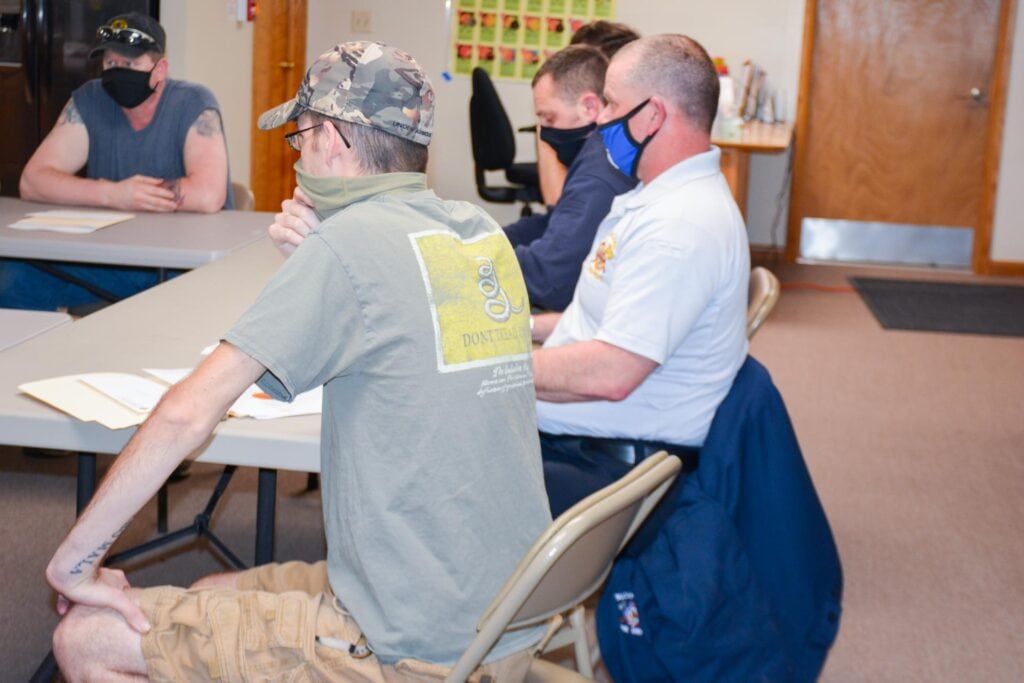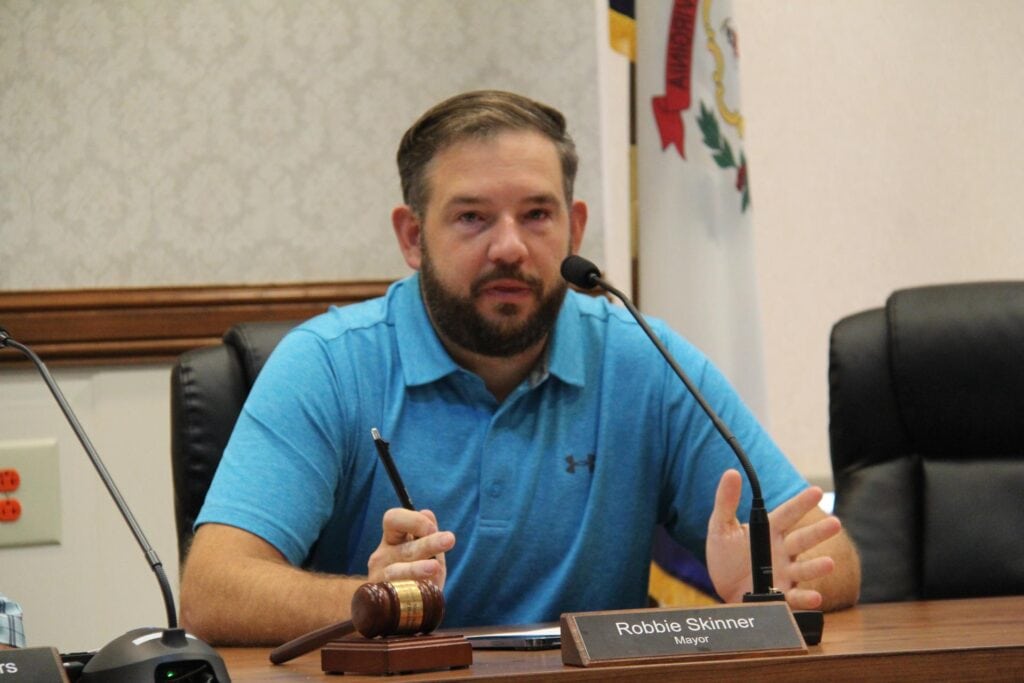BUCKHANNON – Buckhannon City Council is considering a plan to fund three new firefighter positions for one year with CARES Act funds.
At the Upshur County Fire Board’s meeting Tuesday evening, Buckhannon mayor Robbie Skinner said when council votes on its fiscal year 2021-2022 budget Thursday night, he expects the three full-time firefighter positions to be funded for one year with Coronavirus, Aid, Relief and Economic Security Act money the federal government allocated to the City of Buckhannon – and cities and counties nationwide – in March 2020.
“I can’t speak for anybody else but myself, but I believe that on Thursday night, when we pass our budget, we are going to be utilizing CARES Act money that we’ve received to help fund our three new firemen for this year,” Skinner told the Upshur County Fire Board at its March 16 meeting. “Then, this next year, we’re going to work with [the county commission] to try to come up with whatever the solution looks like moving forward to make sure that our staffing is appropriate and continues to be a priority.”
Including salaries, benefits, equipment and training, hiring the three career firefighters would cost approximately $200,000 for one year. When Buckhannon Fire Chief J.B. Kimble delivered his budget presentation in February, he told council a needs analysis he conducted showed the BFD, which currently employs six full-time firefighters and the chief, is not meeting minimum safety protocols for fighting structure fires.

While Skinner has expressed support for using the money collected through the city’s 1 percent sales tax to fund the three new positions, other council members have been reluctant to endorse using sales tax as a long-term funding solution, arguing that it is likely to fluctuate with people’s spending habits. They also note that nearly half the calls the BFD responds to are outside city limits.
Another option for funding the positions is instituting a first due fire fee – a proposal the Upshur County Commission and county volunteer firefighters oppose. The county departments have no paid firefighters.
A third option would be to raise the county fire fee, which has not been increased since 2001 and remains $25 per year for residents and $50 for businesses; the commission has expressed willingness to consider raising the fee, which it agreed is outdated. But it says that would first require a petition from 10 percent of the registered voters.
In fact, the topic of Tuesday’s Fire Board meeting was consideration of raising the county fire fee, but discussion quickly turned to the proposed first due fee and the impact all-volunteer county departments believe it could have on them.
Skinner said that a first due fee is on hold for the time being while the city attempts to hammer out a solution with Upshur County Commissioners. The CARES Act funding, he said, would “get the ball rolling with getting the firemen hired ASAP.”
“The conversation about a first due fee … will continue to be a conversation,” Skinner said. “It’s not the only solution that we’re going to try to pursue or look at and that’s where we need to work with the [commission] in the next several months and throughout the course of this year to try to figure out what our permanent funding solution looks like for keeping our fire department well-funded.”
“I hope and I think we have the votes to pass the budget with the three new firemen, but it does not include a first due right now,” the mayor added.
Concerns about the first due fee are rooted in how population is disbursed throughout Upshur County. The first due area is the 54-square-mile territory for which the city fire department is responsible that is outside city limits. Those residents currently pay $25 to the County Fire Board now, and that money is split evenly between all seven county volunteer departments. City residents pay $36 a year and city businesses’ fire fees vary depending on gross receipts.
However, because the population of Upshur County is clustered tightly around the city – primarily in the ‘first due’ area – that would shift a large amount of funding from the county Fire Board to the city. The most recent estimate is that implementing a first due fee could leave only about $58,000 to be split among the six all-volunteer departments.
While volunteer firefighters at Tuesday’s Fire Board meeting said they were seriously concerned about a first due fee, several agreed that it was time to raise the county fire fee.
Ellamore Volunteer Fire Department Assistant Chief Mark Howes said a first due fee was not a viable option.
“There’s no way in the world that’s going to work for us,” Howes told Kimble. “I mean, it will be nice for you. You’re still considering that first due [fee], and there’s no way that can work even if it’s decided to give money back out.”
Skinner said if the city does implement a first due fee, it will make a contribution to the Fire Board that will then be distributed to the volunteer departments to keep them afloat. But Howes said he wasn’t convinced.
“It could change every year depending on your (the city’s) budget, so how can we buy anything and depend on that money?” Howes asked. “We couldn’t. I agree that you need the extra firefighters, but you can’t take [the money] from us because we don’t have it to take from. I just want the board to be aware of what it could do to the rest of us.”
Skinner and city recorder Randy Sanders said they would not support any measure that would result in volunteer fire departments having to shut their doors.
“Our goal is in no way to hurt anybody,” the mayor said. “The better we can do from a staffing standpoint only helps the departments throughout the county because that’s more firefighters we can put on fires and calls. So, the last thing we would ever want to do is for little old Mrs. Smith in French Creek to call 911 and there not be anybody there because the local department doesn’t exist anymore. Any solution that we would work towards would not include that.”
During Wednesday’s meeting, Upshur County Commission President Kristie Tenney, also a member of the Fire Board, outlined the process for raising the county fire fee. Tenney said the commission had been advised by its attorney that 10 percent of registered voters – excluding city voters – would need to submit a petition requesting a fire fee increase to the Fire Board.

“Then, the fire board would make that recommendation if that’s what they would choose to do, to take to the county commission,” Tenney said. “Then, hearings would take place after that, and as long as 30 percent of the qualified voters in the time of 45 days would not come with a petition [then it could be increased]” via a county ordinance.
Howes said it was evident that the county fire fee needed to be increased.
“It’s logical that that’s got to happen,” he said. “It just is. I mean, they talk about it and talk about it and talk about it, and I’m just saying that the plans ought to be being made to raise it or get that 10 percent (of registered voters) we need to get, get the information we need and do whatever we need to do. I don’t think anybody is going to say, ‘I can’t afford $50 a year.’ We need to take time to explain to people what they’re actually going to gain from this. You’ve got to educate the public.”
Banks District Volunteer Fire Chief John Roby agreed.
“We need to get the community more involved and more educated about our fire department and the budget,” he said. “That was my point to you Kristie (Tenney), I’ve talked to you a lot, and I understand the county’s budget, but it’s getting bad.”
Tenney said the commission “absolutely” wants to assist county departments.
The county commission and city council are tentatively scheduled to begin meeting once a month starting in April to address fire department funding concerns, Skinner said.
Howes said he hoped the two entities worked together.
“I want to make sure that you all are actually getting together instead of just meeting like this,” he said.
Fire Board President Joe Gower agreed that a united “working group” approach would be more fruitful than a city-versus-county mentality.













